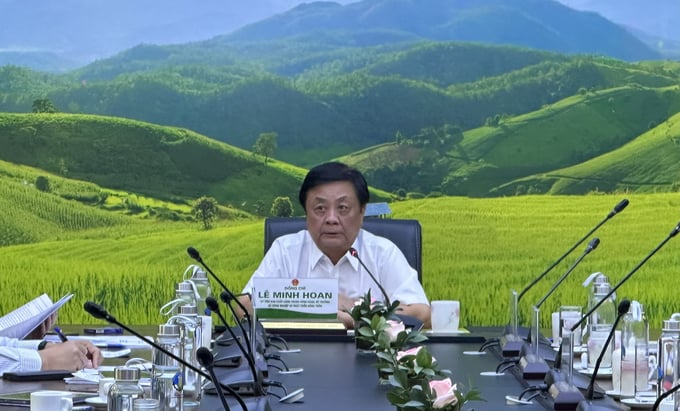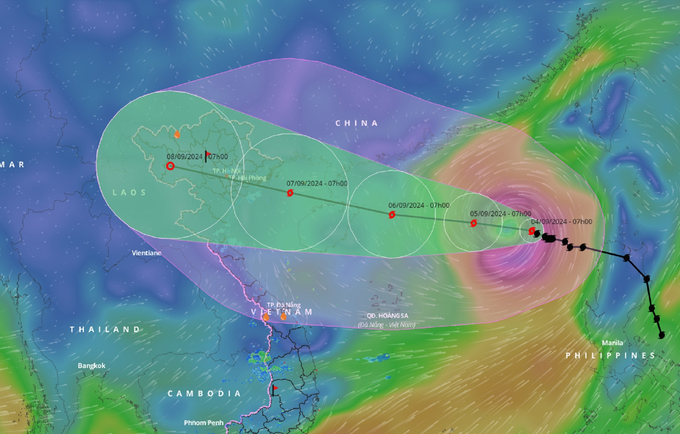June 17, 2025 | 06:14 GMT +7
June 17, 2025 | 06:14 GMT +7
Hotline: 0913.378.918
June 17, 2025 | 06:14 GMT +7
Hotline: 0913.378.918

Minister Le Minh Hoan chaired a meeting on the results of direction and management work in August, the first 8 months of 2024 and key tasks in September 2024. Photo: Duc Binh.
MARD convened a meeting on September 5 to evaluate the outcomes of its directives and operations in August, the first eight months of 2024, and to establish the main tasks for September 2024.
To guarantee that the crop seasons were conducted according to schedule, MARD guided the sowing, care, and harvest of rice during the initial eight months of the year. Effective and timely measures were implemented to prevent, combat, and mitigate the consequences of animal diseases. Furthermore, the Ministry prioritized the implementation of the Sustainable Development Project, which will encompass one million hectares of rice specialized cultivation that is low-emission and of high quality, in accordance with green development in the Mekong Delta until 2030 (the Project). They also convened a conference on illicit, unreported, and unregulated (IUU) fishing, which was presided over by the Prime Minister. Additionally, they advocated for the widespread implementation of Vietnam's electronic traceability system for aquatic products across localities.
Deputy Minister Tran Thanh Nam stated at the September 5 meeting that the Project has demonstrated numerous initial positive indicators. Farmer profits have increased by 40-50%, production costs have decreased by 20-30%, and average emissions have decreased by 5 tons of CO2 per hectare. Additionally, rice yields have increased by 300-500 kg/ha.
It is important to note that residents are now actively enrolling to join the model, indicating their confidence in the Project, rather than merely encouraging participation as was the case in the past. This indicates the success in persuading producers to commit to sustainable production methods that provide more substantial economic advantages.
Furthermore, 160,000 hectares of raw material areas for coffee, citrus, rice, and forests are flourishing. Corporations and enterprises are enthusiastic about collaborating to construct these material zones, which will be connected to cooperative models. This presents an opportunity to concentrate on expanding, investing, and enhancing the value of these basic material zones. Deputy Minister Trần Thanh Nam urged pertinent agencies, including the Department of Crop Production and Forestry, to focus on this issue.

Deputy Minister Tran Thanh Nam said the 1 million hectare rice project has initially brought many positive signs. Production costs have decreased by 20-30%, rice yield has increased by 300-500kg/ha. Photo: Thanh Son.
Deputy Minister Nguyen Quoc Tri concluded the meeting by observing that the forestry sector had numerous positive indicators, with all targets being met or surpassed. The forestry sector fulfills two functions: state management, which involves guiding policy mechanisms, and direct administration of 300,000 hectares of forest under the supervision of 19 forest owners.
Deputy Minister Nguyen Quoc Tri encouraged the Forest Protection Department to provide support to the 19 forest proprietors under the Ministry in the prevention of forest fires and the management and protection of forests. Decree 91, which amends and supplements specific articles of Government Decree No. 156 that detail the implementation of certain provisions of the Forestry Law, has been issued; however, localities remain cautious and hesitant in their implementation. He requested that the Department evaluate the situation and local requirements and furnish early information to facilitate implementation.
The forestry sector recommended that materials and maps be distributed to localities in accordance with the established timeline after the national forestry planning tasks for the 2021-2030 period have been approved, with an eye toward 2050.
The forestry sector has recently sold 10.3 million forest carbon credits from six provinces in North-Central Vietnam at a unit price of 5 USD/ton, with the Prime Minister's approval. The Deputy Minister requested that a report be prepared for the Minister to submit to the Government regarding the sale of an additional 1 million carbon credits measured in this area to the World Bank.
Faced with the forecast of Super typhoon Yagi, which is expected to have hurricane-force winds, Deputy Minister Nguyen Hoang Hiep stated that this is the strongest storm to hit the Gulf of Tonkin in the past 20 years. It is predicted that when the storm makes landfall, it will weaken to level 12, with a natural disaster risk level of 4. The Deputy Minister requested the Department of Dyke Management and Disaster Prevention to provide recommendations.
The Ministry of Agriculture and Rural Development (MARD) dispatched teams to local areas on the morning of September 6 to oversee and direct the situation, as it is anticipated that the typhoon will affect agricultural production. It is imperative to raise awareness in order to encourage individuals to take proactive measures to safeguard their assets and secure their residences, as administrative measures will be decisive. Furthermore, it is imperative to meticulously plan the operation of reservoirs and the drainage of water.
The Northern Delta region is forecasted to experience severe consequences, particularly in agricultural production, if the storm follows the forecast, according to the Department of Dyke Management and Disaster Prevention. At present, approximately 1 million hectares of rice in the region are in the critical flowering stage and are at risk of being severely devastated by severe rain and wind. Furthermore, the North-Central region is approaching the harvest of approximately 15,000 hectares of rice, which heightens the likelihood of crop loss. If heavy rainfall persists, other crops, vegetables, aquaculture, and fruit trees will also be significantly impacted.

Forecasted path of storm No. 3 as it enters the East Sea. Photo: NCHMF.
Deputy Minister Hoang Trung declared that crop production "must remain in place," despite the fact that other sectors can adjust flexibly in response to the severe storm. Local authorities have been provided with comprehensive directives by the Department of Crop Production regarding the management of rice, industrial crops, and fruit trees both prior to and following the typhoon.
The Deputy Minister underscored that the 2024 target output of 43 million tons of rice nationwide will be exceedingly challenging to achieve if approximately 1 million hectares of rice (which are anticipated to yield 6 million tons) are not adequately safeguarded. Furthermore, the surveillance and planning of approximately 63,000 hectares of vegetables and other fruit trees are in dire need of attention.
Rice and vegetables are both susceptible to injury. Consequently, it is imperative to closely monitor the situation, and the deployment of inspection teams to localities will assist in guiding the response more flexibly and effectively, thereby increasing the capacity of local areas to manage the situation, according to Deputy Minister Hoang Trung..
The Deputy Minister underscored the significance of timing in the context of water drainage for inundation during and after the storm. It is imperative to completely drain the area if flooding occurs immediately following sowing and the water persists for a period of 3-4 days. A comprehensive drainage plan is required for the current 1 million hectares of rice, followed by calculations for inundation caused by storm remnants and the discharge from hydropower reservoirs. The Deputy Minister directed pertinent units to maintain a vigilant watch over the situation, with a particular emphasis on the five provinces of the Red River Delta: Ha Nam, Nam Dinh, Hai Phong, Ninh Binh, and Thai Binh.
Deputy Minister Hoang Trung observed that crop production has progressed in accordance with the established plan, resulting in satisfactory yields, after reflecting on the previous eight months of agricultural production.
The agricultural sector has recently signed two decrees that pertain to the export of frozen durian and fresh coconuts to China, thereby augmenting Vietnam's export turnover. These export activities are anxiously anticipated by numerous businesses and farmers. The Deputy Minister encouraged the Plant Protection Department to create detailed strategies to guarantee that farmers and businesses are adequately equipped to export their products with success.
Minister Le Minh Hoan underscored the pressing necessity of preparing for prompt responses to Super Typhoon Yagi. MARD will deploy teams to local areas on the morning of September 6 to monitor the situation and develop specific response plans. The Minister requested that relevant units conduct an inspection and devise support plans for farmers in anticipation of the storm, leveraging the knowledge gained from recent prolonged rains and encouraging businesses to participate.
The Ministry will also prioritize the enhancement of agricultural export quality in the forthcoming period. Nevertheless, the Minister requested that departments create early communication scenarios in response to the issuance of new decrees and circulars.
The Minister proposed the installation of large displays at fishing ports to increase the awareness of fishermen when they depart or return, in relation to the issue of IUU. Regarding the EUDR issue, negotiations with the EU's technical team in the three sectors of coffee, rubber, wood, and forestry products should be prioritized. The intention is to implement this in early 2025 for exports to the EU.
A draft decree regarding the cultivation of medicinal plants beneath the forest canopy remains in effect in the forestry sector. In order to address production challenges for export and guarantee sustainable development within the forest canopy, the Minister designated the Department of Crop Production to collaborate on the establishment of plantation codes for specialty medicinal plants, including ginseng.
Translated by Linh Linh

(VAN) The working delegation from the Ministry of Agriculture and Environment conducted an important trip to the Netherlands to strengthen strategic partnerships and sustainable development in the agricultural sector.

(VAN) The letter ‘A Plea from the Ocean’ not only evokes emotion but also awakens the human conscience to the responsibility of protecting life on Earth.

(VAN) The Department of Agriculture in South Africa has announced the country’s first mass vaccination of poultry to prevent local birds from contracting avian influenza.

(VAN) Establishment of the Mekong Delta Regional Agricultural Linkage Center, aiming for a closed value chain, deep processing, trading platforms, and international market connectivity.

(VAN) Gia Lai province has recently recorded 460 rare species of animals and plants, contributing to forest conservation and biodiversity planning in the region.

(VAN) Ms. Caroline Beresford, New Zealand Ambassador to Vietnam, expressed confidence that agricultural cooperation between Vietnam and New Zealand will develop sustainably, be climate-resilient, and promote gender equality.

(VAN) Vietnam reaffirms its commitment to international cooperation in fostering sustainable and responsible fisheries while ensuring resilient livelihoods for small-scale fishing communities.